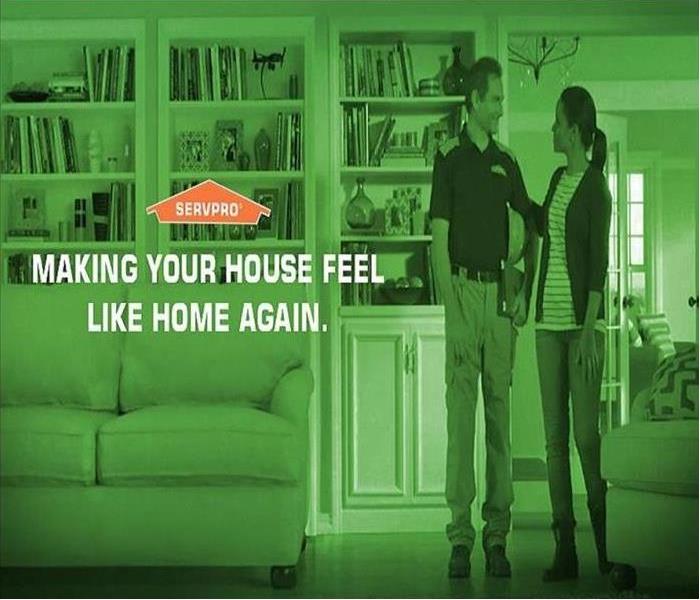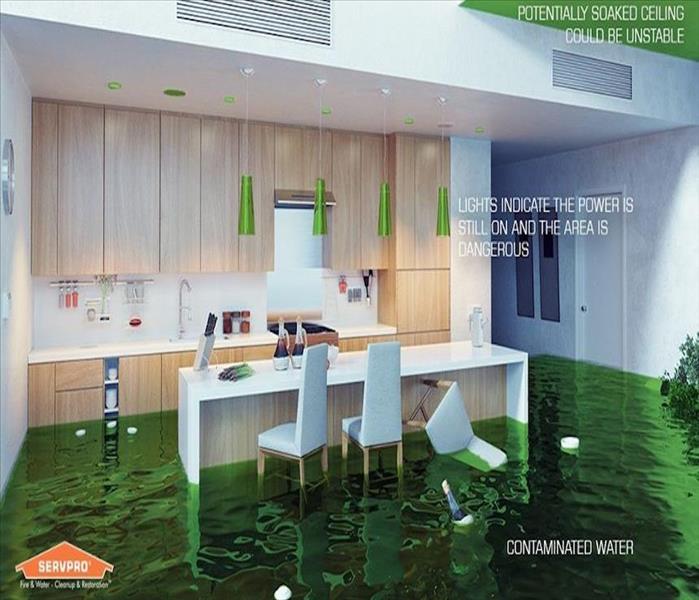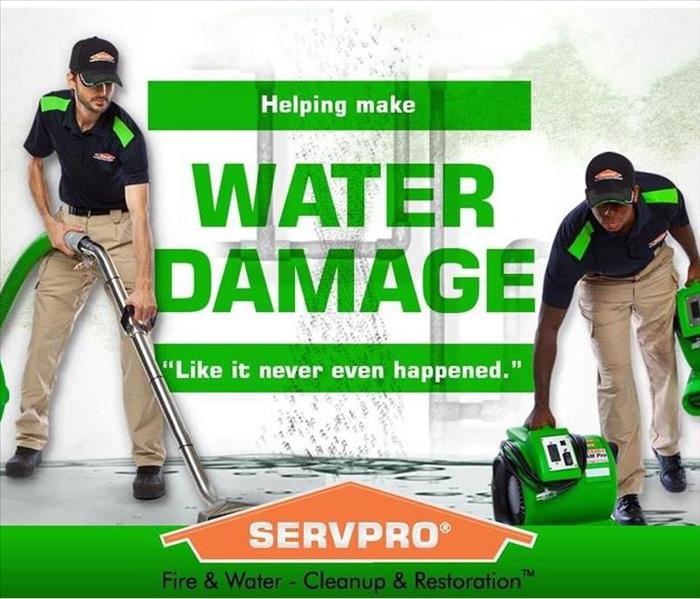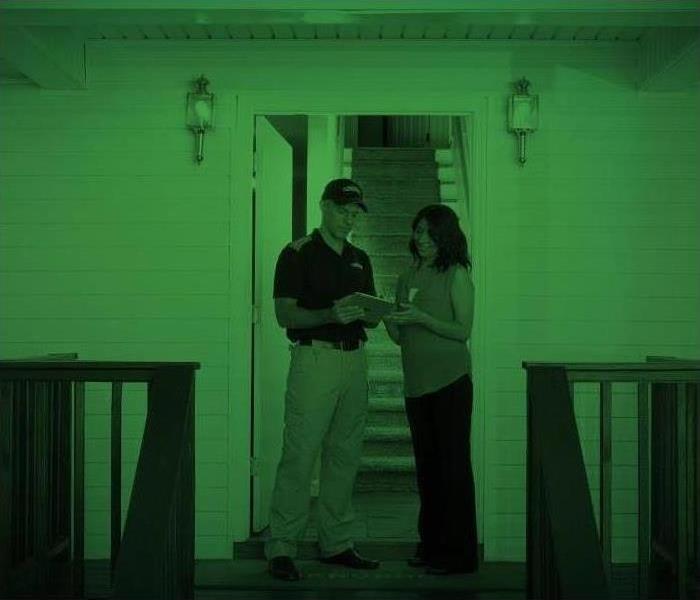Recent Water Damage Posts
Preempting Water Issues In Your Home ~SERVPRO of Northwest Bergen Is Here to Help
9/3/2024 (Permalink)
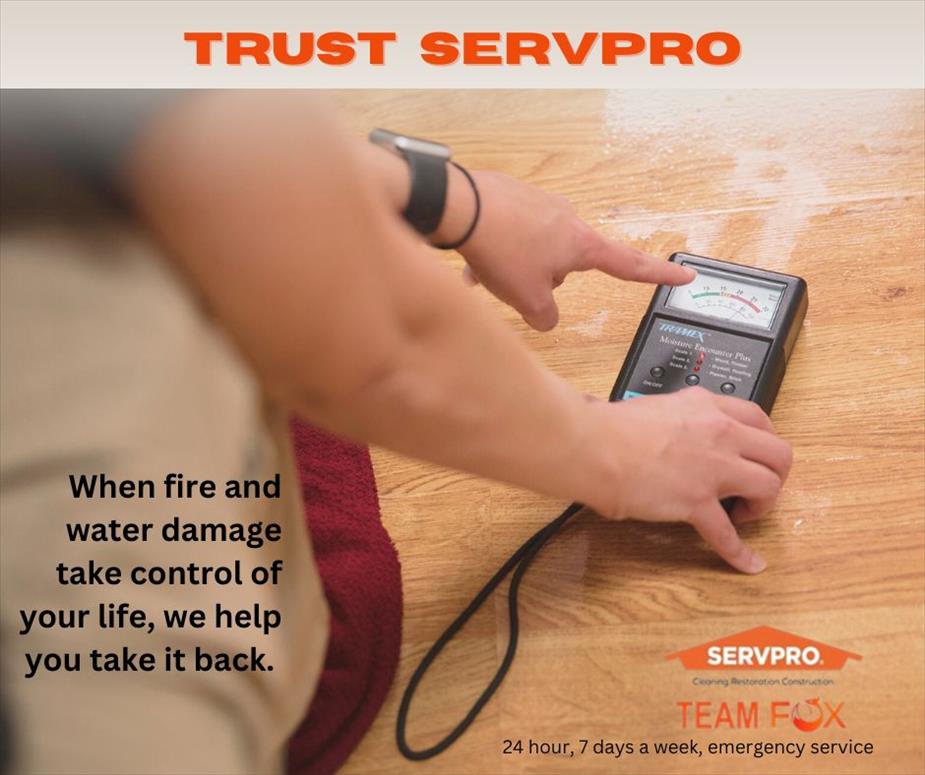 Water damage from a leak or broken appliances can lead to major damage if it is not taken care of quickly. Call SERVPRO of Northwest Bergen.
Water damage from a leak or broken appliances can lead to major damage if it is not taken care of quickly. Call SERVPRO of Northwest Bergen.
In every pipe, hose and connection, your water is waiting—even now—for an opportunity to break free of restraint and get out. And if it finds any opportunity to free itself, it will absolutely take it.
That’s why it’s important to be familiar with the areas around your home that may be susceptible to leaks and failures—and if you can keep your guard up, you might be able to catch some escapes before they happen.
Toilets. Your toilet only has a couple of places that would end up putting water in your actual floor—namely the valve seal, the supply hose and possibly the wax seal under the toilet itself. Inside the tank, you might develop leaks from your rubber flapper as well—these will waste water, but not spill it.
Appliances. If an appliance uses water, it has to use hoses, joints and washers to move that water around. Washing machines in particular are known for developing leaky hoses. Oh, and do mind the age of your water heater. If it gets too old, it is more like to burst.
Clogged gutters. Clogged gutters are probably the most preventable water damage scenario, because it’s a relatively simple task to get up there and remove the leaves and dirt that would become a problem.
Roof damage. Roof damage can come from environmental factors such as sun and rain over time, or acute factors like falling branches and hail. Inspect your shingles from the ground regularly and after any major storm event.
Pipes. Older pipers are prone to oxidation, but even newer pipes can burst or separate if joints aren’t fitted well. And outdoor pipes can get in trouble, too, especially from tree roots.
Blocked garbage disposals and sinks. The wrong foods can make it difficult for your disposal to work, or they can soak up a lot of water even after processing and dam up your sink’s pipes.
Water will try to escape through even the tiniest crack or deficiency, and you can’t predict everything—but routine inspection and prompt action may save you the headache of having to deal with the damage of a leak.
If a water leak erupts into a big problem at home, you’ve got the best team in the business on your side. Contact SERVPRO® today so we can get started.
Cleaning Water Damage Quickly is Important | SERVPRO of Northwest Bergen
8/22/2023 (Permalink)
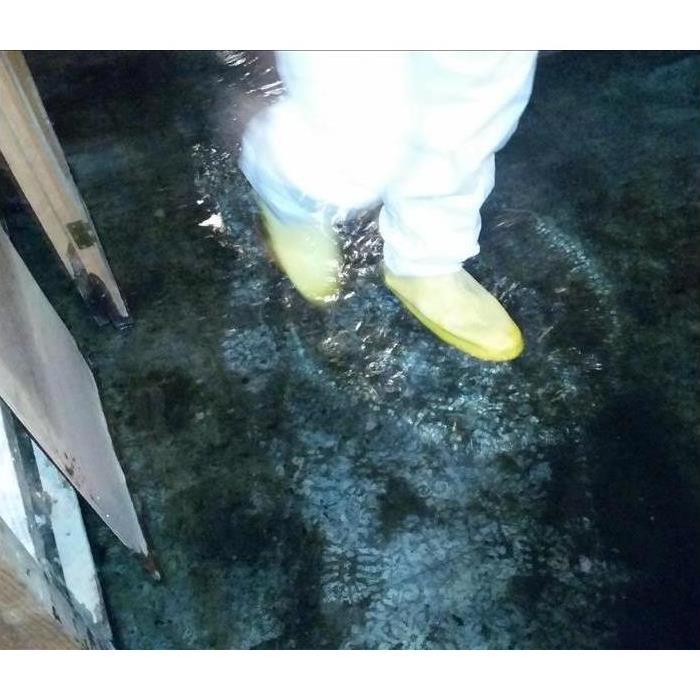 SERVPRO of Northwest Bergen has over 25 years of experience in water damage restoration.
SERVPRO of Northwest Bergen has over 25 years of experience in water damage restoration.
Water damage in your Bergen County home occurs when excess water starts to flood and pool in areas where it shouldn't be.
Several factors can cause this excess water, and therefore, contribute to damage to your property. When you know what the potential causes are, you can take precautionary steps to help you avoid a water loss. You can also spot an issue once it arises and get it fixed before it has a chance to do additional damage.
The faster you see a problem, the less work and extraction there is. Either way, water cleanup needs to be done in your Bergen County home, and you should hire the help of a professional remediation and restoration company to do the job. SERVPRO of Northwest Bergen Customer Service staff and Service Technicians are available to help you at any time with the experience and knowledge that you would expect from a reliable company.
A common cause of water damage in your home is broken pipes and hoses. Things such as aging pipes, a burst water main, or ice maker supply lines and washing machine supply hoses that fail certainly ruin your day. It is a good idea to purchase copper pipes and braided metal lines to replace the original ones, as they hold up much better so you can avoid accidents.
Another common cause for water damage is leaking hot water heaters which can cause major water damage mainly in finished basements. If you are home the first thing to do is shut off the water supply, then call your plumber, often the appliance needs to be replaced. The next steps should be a call to your home insurance company and then SERVPRO so we can help cleanup and dry the entire space while working closely with your insurance company.
No matter what has happened, our SERVPRO Service Technicians can help you get your home dry and back in its preloss condition. We have various tools to help us get the water out, including moisture meters and sensors to find any hidden moisture, pumps to get rid of any standing water over a few inches deep, plus air movers and dehumidifiers to dry everything. We also work quickly and efficiently so additional damage is avoided, such as mold growth.
Another common reason for water damage in your home includes broken toilets and overflowing bathtubs. The toilets overflows or backups are particularly important to clean up properly because of the biohazard contaminants of the “black water,” SERVPRO techs are trained and have protective gear specifically for these types of cleanups. Sewer backups, unfortunately, happen as well. Tree roots can invade and clog your drain lines. Using an enzyme drain treatment to flush out your lines every month during the spring and summer months when tree roots grow the most is a good idea to avoid this kind of disaster.
SERVPRO of Northwest Bergen can help you restore your home after a water damage emergency, no matter what type it is. Call our Customer Service team at (201)236-2400 as soon as you realize there is an issue so we can schedule an appointment and come quickly to clean things for you.
To learn more about Water Damage read our online water damage brochure.
Keep Your Home Dry in 2023 | SERVPRO® of Northwest Bergen
1/10/2023 (Permalink)
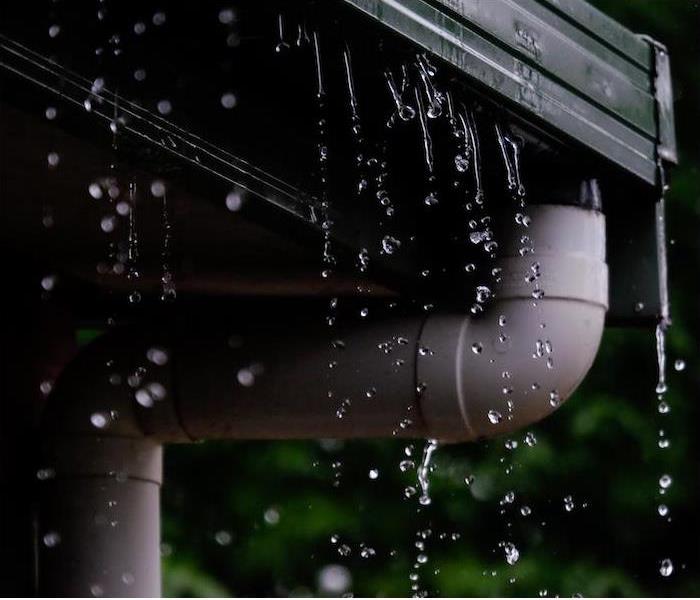 Have water damage in your home? Contact SERVPRO of Northwest Bergen for quick and professional restoration.
Have water damage in your home? Contact SERVPRO of Northwest Bergen for quick and professional restoration.
A brand-new year is upon us already! We always love the start of a new year and all of the possibilities it brings. A new year is also a great time to address any water issues within your home to avoid costly damages.
We want your home to stay dry and avoid water issues, so we offer some great water damage prevention tips in our first blog of the year below!
<h3can-i-find-the-source-of-water-damage">How Can I Find the Source of Water Damage?
Since we use water in our daily lives, leaks can happen anywhere around our homes.
A leak inside your home from your appliances or fixtures could cause a big puddle of water while any roof damage or clogged gutters could lead to a flooded basement or warped walls.
Older homes are also at risk of water damage due to rusting pipes or deteriorating caulk seals. As these places experience wear and tear, you could wind up with a leak or a slowly dripping hole. Moisture can cause water damage, but it can also encourage mold growth or mildew if it is left untreated.
It is also possible to experience water damage on top of water damage! If you experience a water leak somewhere and that water infiltrates one of your appliances’ electrical components, a malfunction could occur and cause even more troubles for your home.
<h3water-prevention-tips">Addressing Water Prevention Tips
One of the best ways to reduce your risk of water damage is to prevent the problem from even occurring in the first place. Catching a problem early can save you a lot of time and money down the road.
It might take a little investigative work, though! Not all water damage is easily noticeable, so you will have to regularly inspect places like your bathroom and kitchen for water staining or mold growth. Wipe down any areas of your home that are often moist, like your sinks or window sills, and check out any spots in your home that start to smell musty.
Getting up on your roof often can help you catch a problem before an even bigger issue occurs. Missing shingles or roof damage can invite water into your attic, where it can cause damage or start a mold infestation.
The winter weather here in the Bergen County area can change drastically! Make sure your family and home is ready to handle the change in temperature and prepare for the possibility of snow and ice at any time. After any weather event, walk around your property and home to look for damage.
Property grading is also always a good option! A professional grading can move your soil in a strategic way to angle your yard away from your home. Any rainwater or flood water that is near your home will flow down and away from your home’s foundation.
Have water damage in your home? Contact us for fast, professional restoration back to preloss condition.
How Water Gets Inside Your Home Unexpectedly | SERVPRO® of Northwest Bergen
12/12/2022 (Permalink)
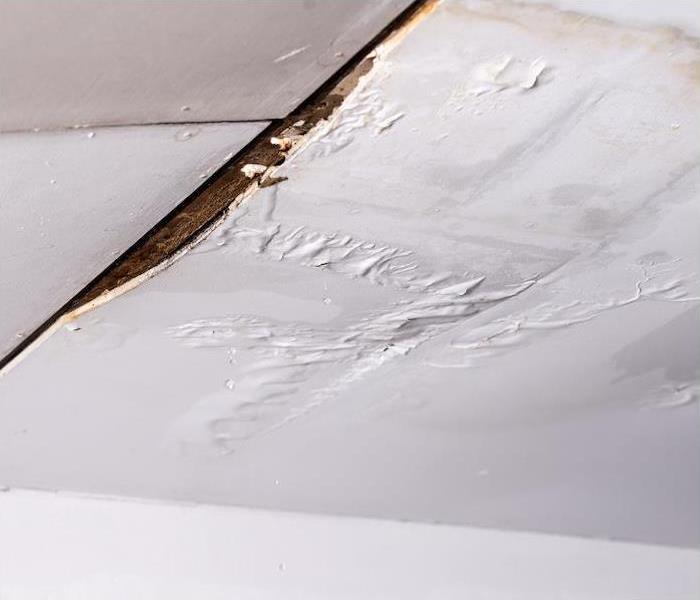 If you experience damage due to a winter storm, call SERVPRO of Northwest Bergen. We have the experience and equipment for any issue.
If you experience damage due to a winter storm, call SERVPRO of Northwest Bergen. We have the experience and equipment for any issue.
It’s not always easy to spot water seepage, but you can look for some key indicators. Excess moisture causes an unpleasant odor; you may also see peeling paint or stains on flooring and walls.
This additional moisture can also cause your appliances to rust, but there are many signs to be aware of. The most obvious sign is a puddle on the floor.
Water damage can result in disastrous outcomes for your home, so keep reading as we uncover the usual suspects and some measures you can take.
<h3fixture-leaks">Water Fixture Leaks
Your home’s water fixtures are not without fault, and holes in your water supply lines can often allow moisture to seep out unexpectedly. Look near the shower, bathtub, sink or toilet for this issue.
Inspect these zones during your cleaning routine, and take action against leaks immediately to prevent thousands of gallons of water from entering your home each year.
<h3from-appliances">Water From Appliances
Refrigerators with water supplies and ice makers can cause leaks, too. Dishwasher leaks usually occur in small amounts over long periods, causing significant damage to your flooring underneath.
Properly inspect for leaks by unplugging the appliance and pulling it out slowly. Check for the presence of water or mold, and contact our restoration team when you notice something to solve the damage fast.
<h3sources">External Sources
Naturally, water damage can also come from outside. A large number of leaks begin externally, with moisture making its way inside through window frames, doorways, and other spots.
In Bergen, we know the dangers of weather-related moisture. We see over 47 inches of rain and over 26 inches of snow annually. While the rain typically is dispersed year-round, the snow piles up and melts altogether, causing abundant water to flow through our properties and streets.
Leaks can come from both inside and outside, but there are steps you can take to manage both causes. Set your house up the right way, and maintain it properly to protect it against water damage.
Begin by watching your gutters and downspouts. These frequently clog and allow water to pool on your roof. This extra water weight can allow moisture to seep inside and even cause a partial collapse where the water is located.
Inspect the seals on your windows and doors, and replace any that you can tell aren’t working properly. Lastly, consider implementing landscaping techniques that direct water away from your home. Follow these steps and improve your home’s ability to fight water damage.
If you experience water damage inside your home or business, call us, 24⁄7. We have the experience and equipment to get your property back in working order fast.
Protect Your Home From Water Damage With These Tips | SERVPRO® of Northwest Bergen
9/8/2022 (Permalink)
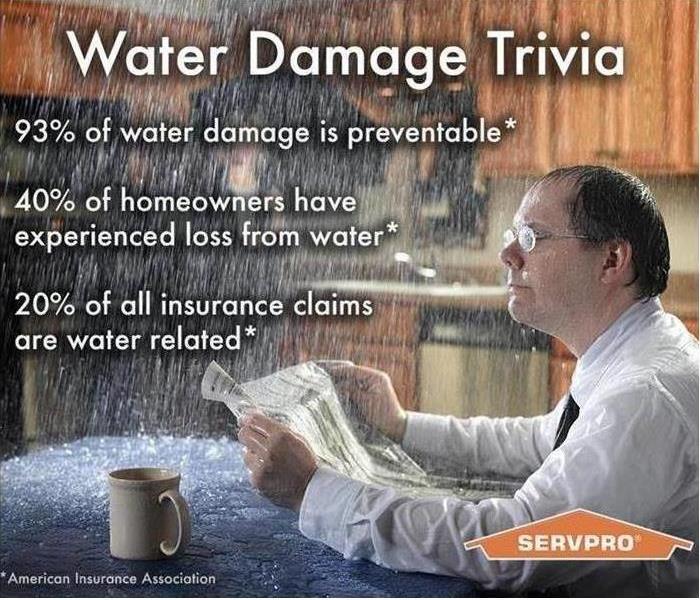 Experienced water damage in your home? Call SERVPRO of Northwest Bergen to get the restoration process started right away.
Experienced water damage in your home? Call SERVPRO of Northwest Bergen to get the restoration process started right away.
Water Damage can cause major problems to your Bergen County home. Whether you are dealing with broken pipes or a natural disaster, any number of things can cause flooding at your property. Besides the damage to any of your belongings and appliances, you have to find a way to get the water out of the home, and completely dry out the premises in order to avoid a problem that is compounded by unwanted mold growth. If you are dealing with water damage in Bergen County, the first step is to begin the water removal process.
It is always best to call in the professionals at SERVPRO of Northwest Bergen when the job is too big for you, and you don't have the equipment or manpower to properly complete the water removal process. Also, notify your insurance company and take pictures of everything before any work is done at your property. If you are going to get any kind of insurance payout, it will be necessary to have proof of the full extent of water damage at your property.
What you should do Before SERVPRO Arrives:
Think about electricity before you enter the property or space until you know it is safe.
Remove any contents you don’t want that have water damage.
Move contents to higher level if there is no water damage to them.
What WE do when we arrive to your property:
Once we are sure it is safe to actually go into the flooded area of the building, we dress in protective gear, because it is a possibility that the water is contaminated. At this time our SERVPRO Production Manager assesses the damage, and will guide you through the process of insurance claims, give you an estimate and the best course of action to clean up the damage.
Water Removal:
We will now be able to remove what needs to be replaced, from dry wall to flooring. Then the Service Technicians will arrive in our “SERVPRO Green Trucks” with the required equipment of portable water extraction units to remove any standing water. After the water is removed air movers, fans, and/or floor drying mats can be place to completely dry the area.
What WE do after the water and moisture is removed:
When the water has been removed, along with any damaged belongings, we will need to perform a thorough cleaning with a disinfectant. This ensures that secondary damage does not occur and your home is clean and dry. Now the rebuilding process can begin.
When your Bergen County home has water damage from flooding or leaks, we have the expertise and equipment to properly restore your property. The water removal and drying process is completed by our highly-trained technicians who will document the entire process. This validates that your property has been dried properly and thoroughly.
Contact SERVPRO of Northwest Bergen for all of your water damage needs we have 24 hour/7 days a week emergency service.
Call today (201) 236-2400!
Understanding different types of Water Damage in your Ridgewood NJ home or business
6/7/2022 (Permalink)
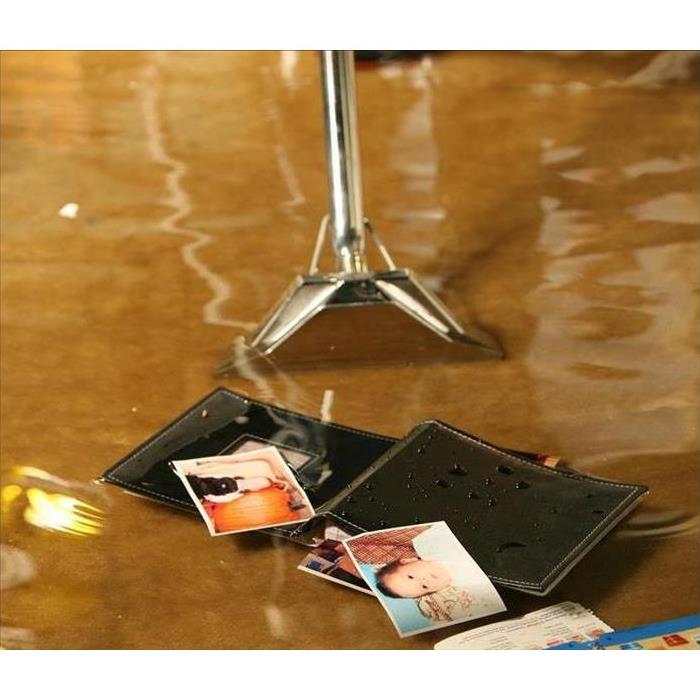 Call SERVPRO of Northwest Bergen for any size water damage disaster.
Call SERVPRO of Northwest Bergen for any size water damage disaster.
Understanding what type of water you are dealing with is critical to ensuring proper cleanup.
There are three types of water.
Clean water is water from a broken pipe, other water source, and rainwater.
Grey water is used to describe slightly contaminated water, which is usually clean water that has been left untreated allowing bacteria and other contaminants to begin growing, making the water hazardous.
Black water is highly contaminated and filled with fungi, bacteria, chemicals and more. Black water typically caused by sewage damage, flooding or any type of natural disaster.
When you have water damage, don't leave your Bergen County residential or commercial property to chance. Our Service Technicians are highly qualified, have the necessary equipment and follow every protocol to properly cleanup your property.
Call SERVPRO of Northwest Bergen County to professionally cleanup any size disaster.
The Destruction Water Does to Your Home or Business as Time Passes | SERVPRO® of Northwest Bergen
5/5/2022 (Permalink)
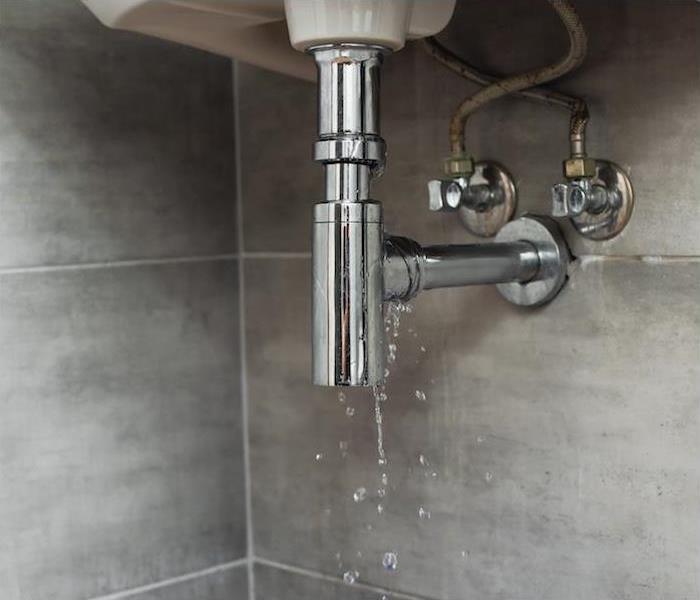 SERVPRO of Northwest Bergen is your 24/7 water restoration expert. Call us right away if you need immediate service.
SERVPRO of Northwest Bergen is your 24/7 water restoration expert. Call us right away if you need immediate service.
Certain indicators like a leaky faucet or minor spots of water can seem very unimportant, but you should never underestimate the damage that moisture can cause in your home. An average household leak can waste up to 10,000 gallons of water in a year.
The progression of water damage is faster than you expect, seeping into your walls, floors and any soft surface. If you don’t address the problems immediately, it will be difficult to achieve the best restoration results.
Here we’ve included the important information regarding the timeline of water damage:
<h2the-first-24-hours">In the First 24 Hours
If you live in a house, there is a one in four chance of a flood damaging your home within a 30-year period in a high-risk area. Knowing what to do next is essential.
The first 24 to 48 hours after flooding or water damage are crucial. Certain items will immediately fall victim to water’s disastrous effects.
Any soft material like fabric furnishings and upholstery will soak water in, and untreated wooden structures can swell when exposed to moisture. Even worse, your personal belongings such as photographs, documents, paintings and books are especially at risk to damage and warping beyond repair. During this time, mold can begin to grow, so taking action immediately is essential.
SERVPRO has over 50 years of experience, so combining our expertise with the “restore vs replace” mentality can help save you money while protecting your beloved and irreplaceable keepsakes.
If any item has gone beyond the potential for restoration, we will make sure to communicate this to you immediately. We will have to remove these items quickly to lessen the spread of moisture and enhance our ability to dry all restorable materials.
<h2the-first-week">Within the First Week
After the first 24 hours, water damage will progress further and quickly. Mold can spread like wildfire with excessive moisture. As mold sets in, it can even damage the home’s structure.
Additionally, porous surfaces such as wood surfaces and walls will become increasingly compromised, and metal surfaces will start corroding.
Even treated materials are susceptible to water damage at this point, and not just the items that are submerged in water. As time passes, the standing water evaporates and rises to areas above the visible damage, affecting places you wouldn’t initially think of.
<h2one-week">After One Week
After a week’s worth of exposure to moisture, the damage can extend so far that it becomes irreversible; you must avoid letting moisture and water damage stay untreated for lengthy amounts of time.
As the moisture works its way deeper into the home, the costs and efforts needed to restore the structure will skyrocket, as well as the risks of severe structural damage.
<h2SERVPRO-will-help">How SERVPRO Will Help
SERVPRO’s restoration process begins with the first call, preferably within the first 24 hours. Service work normally starts with a thorough extraction of water. This helps prevent the spread of water in the structure and reduces the overall drying time of your structure and belongings.
It’s very likely that any affected furniture, flooring, carpet and belongings will need a deep cleaning, sanitizing and deodorization. Once we have removed most of the water, we send in our specialists to use our industry-leading technology that can remove the water you can’t see.
After performing the initial steps, your home or business may need construction work to restore your property back to preloss condition. This step could be very minor repairs, or it could be rebuilding major sections of your building.
We prefer to simplify the restoration process for you, handling both the initial damage mitigation and rebuilding any affected areas that require it. SERVPRO will ensure that you are kept in the loop and that you’re back in your home or business in no time.
Regardless of the type of water damage sustained, SERVPRO has the tools and teams to help your home or business recover. Contact us 24⁄7 when you need a dependable team to help you recover.
Your Custom Water Damage Recovery Plan | SERVPRO® of Northwest Bergen
1/6/2022 (Permalink)
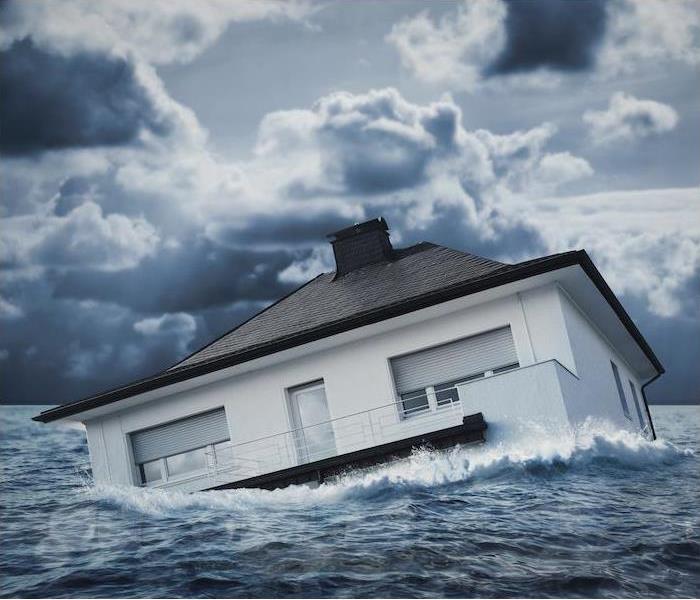 When water damage strikes, make the call to SERVPRO of Northwest Bergen for A-to-Z cleanup and restoration.
When water damage strikes, make the call to SERVPRO of Northwest Bergen for A-to-Z cleanup and restoration.
For the math majors out there: If 14,000 Americans fall victim to a water damage disaster each day, how many folks are undergoing that aquatic stressor each hour? How about each minute?
Answer: too many.
The day may never come when you become part of that unfortunate statistic, and we hope it never does. But should the need arise for sudden help to rid your home or business of rushing water, here’s what the process will look like when you reach out to SERVPRO.
Emergency Contact. Right away when you click or call, we’ll want to know a few things to guide us to a proper understanding of your scenario. This will lead to an appointment, so we can nail down a time soon thereafter to arrive on site with tools and technicians.
Inspection and Water Damage Assessment. We’ll survey the situation, building a customized plan for water removal and cleanup. We’ll also make sure you’re aware of any lurking hazards, and we’ll go over items from your home that may need to be replaced.
Water Removal. Big, powerful pumps come in next, to clear out the myriad gallons of water that have invaded your space. We’ll employ industry-leading techniques and tools to enact a complete removal of the offending substances.
Damaged Material Removal. Once the bulk of the water has been cleared, we can safely move on to the haul-away of items that have undergone too much damage to be restored.
Cleaning, Sanitizing and Deodorization. Almost all water issues leave behind some stains and cleaning needs, and sewage backups and floods introduce toxins and other sanitation needs to your home environment. We’ll make sure all this gets cleared up.
Drying. The absence of water doesn’t necessarily signify the absence of moisture. Mold can grow quickly if excess moisture remains after water damage, so we’ll use specialized vacuums to dry out both the atmosphere and affected surfaces of your home to make sure mold has nowhere to reside.
Monitoring. We’ll keep an eye—both, actually—on the entire process, from arrival to finish, to ensure things are running smoothly and all techniques are being employed effectively. If any needed changes emerge, we’ll make them happen.
Repairs and Construction. Everything is dry; now we can rebuild. Our first love is restoration, so we’re glad to be able to perform repairs and reconstruction where necessary. It streamlines things for you and your insurance company as well!
When water damage strikes, make the call to SERVPRO for A-to-Z cleanup and restoration. We’ll make your damaged property look “Like It Never Even Happened.”
The Shocking Numbers of Water Damage | SERVPRO® of Northwest Bergen
12/9/2021 (Permalink)
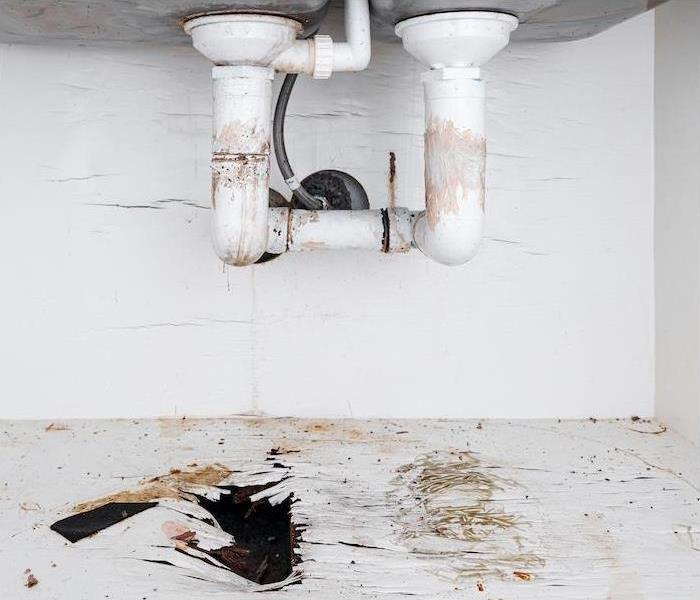 If water damage catches you off-guard and leaves you all wet, you’ve got help on your side. Contact SERVPRO of Northwest Bergen County.
If water damage catches you off-guard and leaves you all wet, you’ve got help on your side. Contact SERVPRO of Northwest Bergen County.
There’s a war going on in your home everyday—a struggle. A tussle not between good and evil, but between your pipes and the water they contain. It’s not totally unlike that superhero movie where the big, purple bad guy declares himself to be…how did he put it? Inevitable.
There are a great many ways for water to escape the hoses and systems coursing through your property, and given its way, it will find and exploit a weakness to rain down destruction upon your home. That’s why it’s absolutely critical that your plumbing be well-equipped and maintained—so that you can put up your best fight against this “inevitable” invader.
Let’s look at some numbers for context.
24. This represents the percentage of all home insurance claims centered around water damage. That’s a quarter of all claims, and it means one of every 50 homes will experience water damage every year. How do you like your chances?
48. This is the number of hours you have to quell the growth of potentially toxic mold after a water damage situation. Truth be told, it might not even be that long.
98. The unfortunate percentage of basements that will experience water damage at some point during the life of the house. If there’s one type of claim that is truly inevitable, this one comes close to being it.
10,234. This is the number of dollars spent repairing the average water claim. Considering how much water a single crack in a pipe can unleash in a day’s time, it’s no surprise that water damage can quickly take its toll.
14,000. This is the number of water events that happen across the United States each day. Read it again—that’s not a monthly stat, that’s every single day. Every six seconds someone’s pipes are bursting.
13,000,000,000. Once you’re dong counting all those zeroes, we can tell you that this is the average annual cost of water damage claims in the United States. It’s kind of a problem.
Is water damage inevitable? Not exactly, but it’s going to take some work to prevent. If you can make it a priority to keep your plumbing updated, your water appliances up to date and your hoses switched out periodically, you’ll be able to put up your best defense against the hidden danger running through your home.
If water damage catches you off-guard and leaves you all wet, you’ve got help on your side. Contact SERVPRO to see how we can quickly and fully restore water damage to your home or business.
The Water You Don't See May Cause More Damage To Your Bergen County Property
11/16/2021 (Permalink)
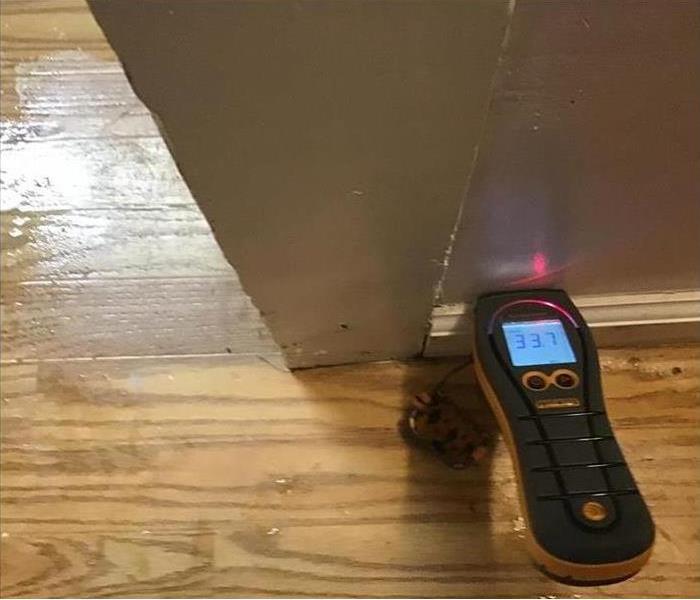 SERVPRO of Northwest Bergen County is dedicated to providing expert water damage cleanup in the Bergen County area.
SERVPRO of Northwest Bergen County is dedicated to providing expert water damage cleanup in the Bergen County area.
Even small water damages have the potential to cause serious structural and indoor air quality issues over time.
The key to avoiding costly future restoration is to handle every water problem as a real threat to your property. SERVPRO of Northwest Bergen County has the equipment, training and experience to test for and find unseen water before secondary damages occur. The proper equipment makes a measurable difference in reducing the damage expense during a fire or water loss. When time matters, technology and equipment must be counted on to perform.
We have a full arsenal of drying equipment. Here are a few of the tools used by our trained SERVPRO of Northwest Bergen technicians.
- Moisture Sensors are used to detect moisture in carpets, baseboards and walls.
- Moisture Meters are used to determine the actual moisture content of various materials. The moisture tester provides accurate readings, allowing SERVPRO to monitor the drying process.
- Thermohygrometers measure temperature and relative humidity. When armed with this information, SERVPRO staff can calculate and create an environment most conducive to drying. When facing a contaminated water loss, it is not only important to dry the structure, but the structure must also be disinfected and often deodorized.
- Ultra Low-Volume (ULV) Foggers will atomize liquid deodorizing agents, producing a fine mist that can easily penetrate the site where odor-causing residues may accumulate. This device can also be used to inject fungicides and disinfectants into wall cavities and other hard-to-reach areas.
- Thermal Foggers dispense solvent-based products by creating a dense fog. The fog consists of tiny particles of deodorant solution that attach to and neutralize odor-causing particles.
The bottom line? At SERVPRO of Northwest Bergen County we have the training and equipment to help make it "Like it never even happened."
Freezing Temperatures May Lead to FreezingPpipes and Water Damage in Bergen County Properties
11/11/2021 (Permalink)
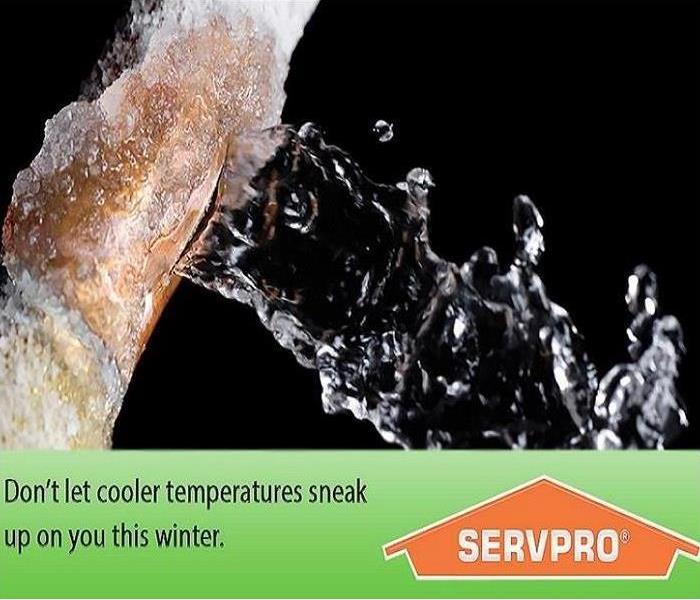 SERVPRO of Northwest Bergen can help with water damage in your Bergen County home or business.
SERVPRO of Northwest Bergen can help with water damage in your Bergen County home or business.
With temperatures getting colder in the Northern New Jersey area there is a potential for pipes to freeze and cause serious water damage both outside and inside your home. Here are some tips to avoid frozen pipes in your home or business property.
On the inside:
If you will be away from home for days at a time, make sure that all of your pipes are kept warm, especially in spaces that receive little or no heat. If any pipes will stay exposed to freezing temperatures, open up one faucet with a very small drip to keep water moving through the pipes. Also, leave cabinet doors open to expose pipes to the air temperature within the room.
On the outside:
Protect your pipes as you would protect your plants. Cover up your outside faucets with foam or towels to insulate them. Make sure the water is turned off from the main valve. If you plan to be away from home this winter, remember to leave your contact information with a neighbor. You might consider giving them a key to your home, too, and leaving your preferred plumber's contact information behind should an emergency occur.
If your pipes burst and your home has water damage call your plumber and SERVPRO of Northwest Bergen County. We specialize in the cleanup and restoration of homes and commercial properties after water damage disasters.
SERVPRO: The Science of Drying
7/20/2021 (Permalink)
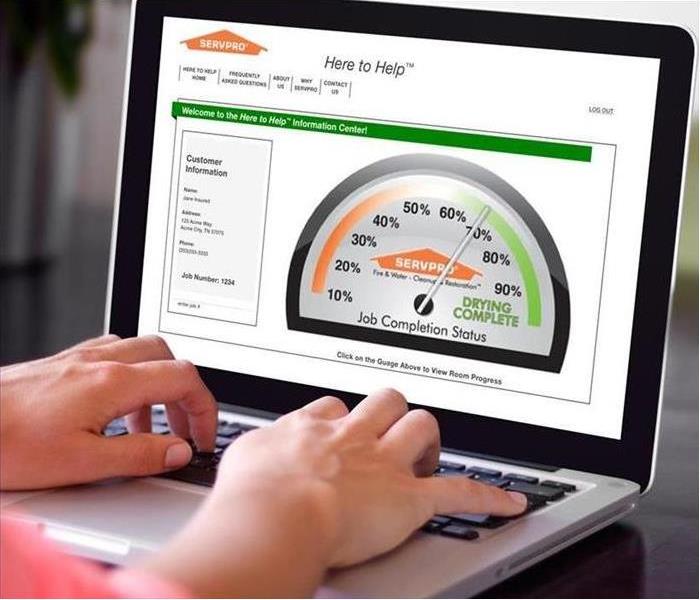 DryBook provides a real-time documentation and updates on the drying process.
DryBook provides a real-time documentation and updates on the drying process.
Did you know there is actually a science behind the process of drying?
Having the knowledge of psychrometrics is essential to restoring a water-damaged structure to its preloss condition. SERVPRO technicians are trained in the science of drying and follow strict industry approved standards. This helps lower the chances of any secondary damages like mold growth.
Here are the steps we will take to ensure your water damage restoration is handled correctly and efficiently.
- Inspect the building to detect every component that is wet to help prevent secondary damage from happening.
- Measure how much moisture is in wet materials is in wet materials and monitor whether the materials are drying properly.
- Speed up Mother Nature by using professional drying equipment.
What exactly does it mean to help "speed up mother nature"? A wet building can often dry naturally because the environment always seeks equilibrium. When materials are wet, moisture will naturally move to drier air at the surface of the material-but only if the air-is drier. The only issue is that nature often takes too long and secondary damage such as mold may occur.
SERVPRO of Northwest Bergen County has special equipment such as Dry Matt System for Wood Floors and tools to help dry hard wood floors, and hard to reach spaces inside walls. We use modern moisture monitoring equipment and a proven scientific process called DryBook to help speed the drying of your home or business.
DryBook is a proprietary tool that provides real-time documentation and updates on the drying process. It helps ensure industry drying requirements are met. With DryBook Mobile, you have the ability to know exactly where your property is in the drying process.
SERVPRO of Northwest Bergen has the training, equipment and technology to help make your water damage disaster "Like it never even happened."
The Must-Know Signs of Basement Water Damage | SERVPRO® of Northwest Bergen
5/21/2021 (Permalink)
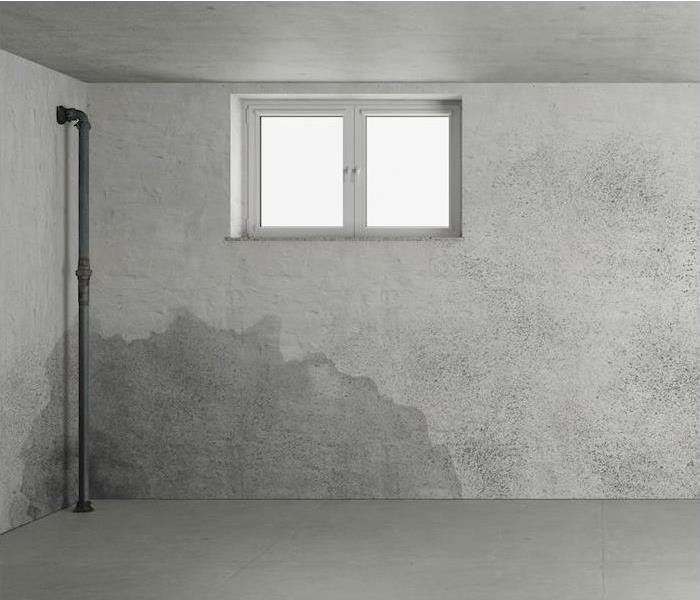 SERVPRO of Northwest Bergen is a full restoration company. Our team of experts are on call and ready to help you determine the best course of action.
SERVPRO of Northwest Bergen is a full restoration company. Our team of experts are on call and ready to help you determine the best course of action.
A Bergen County home with a basement is often a big pro to house hunters, and if you have had one in your home, you likely understand why. Basements are multipurpose spaces that can be used for storage, shelter from severe weather and even living spaces if they are partially or fully finished.
While there are a lot of reasons to love a basement, having a home with one does not come without its drawbacks. Basements have become synonymous with water damage over the years, and while it does not have to be this way, it is something to keep in mind if you have a basement of your own.
Understanding the signs that water damage may be working its way in is a must for any homeowner so you know when to call in the professionals and get the issue treated for good. Take a look at some common indicators of water damage below.
Common Indicators of Water Damage in Basements
Unpleasant, musky odors. While clean, fresh water does not have a smell on its own, as it soaks areas of basements and then evaporates away, it can develop a rather strong, musty odor that can’t be missed. This is often referred to as “basement smell,” but really, it does not have to be that way. This smell is a direct result of mold and mildew being present in the room, which can often be hard to find but easy for your nose to pick up on.
Flaking paint on masonry or walls. With the best intentions, people will often apply waterproof paint to the interior surfaces of a leaky basement. Unfortunately, this paint will simply mask the problem for a while and then lead to a compounding issue down the road. Water that seeps in will eventually work away at this paint, leading to peeling, cracking or bubbling on its surface.
Foundational cracks. It is normal for homes—especially older ones—to shift over time, but anything larger than a hairline crack should be taken seriously. Cracks can arise in any surface, from the ceiling to the floor to the walls, and can even let more water in over time. If you notice large cracks anywhere in your basement, it is likely a good time to call the pros.
If you notice any of these signs in your basement, let us take a look. Our expert water restoration technicians can help you determine what is causing these issues and how to treat it properly. Contact us today to learn more.
SERVPRO Has Drying Down To A Science
4/25/2021 (Permalink)
Did You Know there is actually a science behind the process of drying?
At SERVPRO of Northwest Bergen we have the Knowledge of psychrometrics which is essential to restoring a water damaged structure to its preloss condition. While your initial reaction may be to grab a few towels to mop up the mess and place a fan or two around the damaged area, SERVPRO of Northwest Bergen is trained in the science of drying and follow strict industry-approved standards to help lower the chances of any secondary damages.
SERVPRO of Northwest Bergen County will:
- Inspect the building to detect every component that is wet, to help prevent secondary damage from happening.
- Measure how much moisture is in the wet materials and monitor whether the materials are drying properly.
- Speed up Mother Nature by using professional drying equipment.
SERVPRO technicians use the latest technology to help ensure your property is dried quickly and efficiently. DryBook™ is a proprietary tool that:
- Manages industry drying requirements.
- Provides real-time documentation on the drying process.
- Validates that services are executed to standards.
- Reports to all stakeholders involved.
- Allows real-time updates through DryBook™ Mobile Integration.
The bottom Line? SERVPRO of Northwest Bergen has the training and equipment to help make water damage in your Mahwah, Wyckoff or Ridgewood, New Jersey home or business "Like it never even happened."
To learn more about water damage and the process of cleaning your water disaster visit Water Damage Restoration Process
It's the Water You Don't See
4/20/2021 (Permalink)
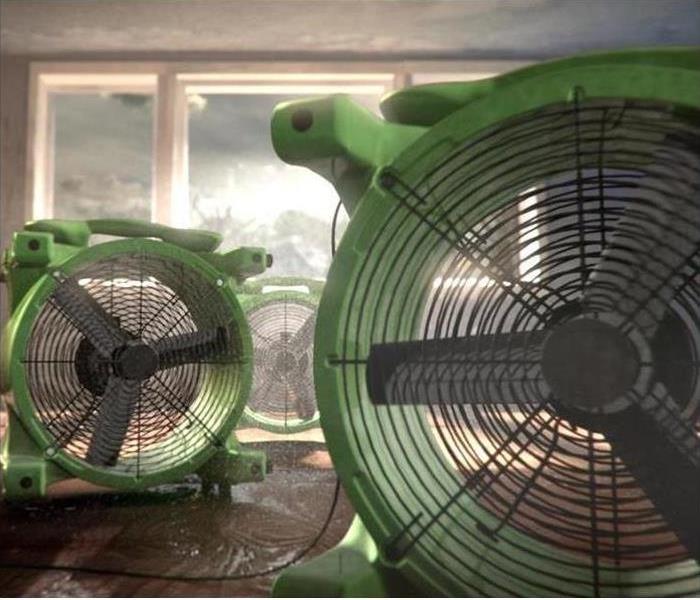 Drying Fans
Drying Fans
Even small water damages at your Bergen County home has the potential to cause serious structural and indoor air quality issues over time.
The key to avoiding costly future restoration is to quickly handle every water problem as a serious problem that will affect your property. Our service technicians have the training and equipment to find and dry unseen water before secondary damage occurs. The proper equipment makes a measurable difference in reducing the damage and expense during a fire or water damage event.
When time matters, technology and equipment must be counted on to work, here are just a few of the tools our technicians use to do their job and restore your property.
Moisture sensors are used to detect moisture in carpets, baseboards and walls.
Moisture Meters are used to determine the actual moisture content of various materials. The moisture tester provides accurate reading, allowing technicians to monitor the drying process.
Thermohygrometers measure temperature and relative humidity. When armed with this information, technicians can calculate and create an environment most conducive to drying. When facing a contaminated water loss, it is not only important to dry the structure, but also to disinfect and deodorize.
Ultra Low-Volume Foggers will atomize liquid deodorizing agents, producing a fine mist that can easily penetrate the site where odor-causing residues may accumulate. This device can also be used to inject fungicides and disinfectants into wall cavities and other hard to reach areas.
Thermal Foggers dispense solvent-based products by creating a dense fog. The fog consists of tiny particles of deodorant solution that attach to and neutralize odor causing particles.
These are just a few pieces of the professional grade equipment that each SERVPRO of Northwest Bergen Service Technician is trained to use to help ensure your property is completely restored. visit https://www.SERVPROnorthwestbergen.com/advanced-technology to learn more.
When Water Damage Strikes: Know What To Do
9/24/2020 (Permalink)
The first 24 hours following a water loss are the most important in preventing secondary or permanent damage to your home or business. To help ensure a water damage is handled correctly complete the following steps:
Emergency Water Damage Tips:
- Shut off the water source if possible or contact a qualified party to stop the water source.
- Turn off circuit breakers for wet areas of the building when access to the power distribution panel is safe from electrical shock.
- Remove as much excess water as possible by mopping or blotting.
- Place aluminium foil or wood blocks between furniture legs and wet carpeting.
- Move any paintings, art objects, computers, documents, and other sensitive valuables to a dry place.
- Don't enter affected areas if electrical outlets, switches, circuit breakers or electrical equipment are exposed to water. Always avoid electrical shock hazards.
- Don't use your household vacuum cleaner to remove water *this could cause electrical shock and/or damage to the vacuum.
- Don't turn on ceiling fixtures if ceiling is wet or enter rooms where ceilings are sagging from retained water. Watch for a possible Ceiling collapse.
After taking the first steps to limit the damage to your Bergen County home or business. The next step in the process is to:
Call SERVPRO of Northwest Bergen
As a leader in the water damage restoration industry we will help you through the process of mitigating the damage. Here are the steps that will happen next:
Inspection: Our experienced SERVPRO of Northwest Bergen Service Technicians will inspect affected areas to determine the extent of water damage and will review the inspection with you to answer any questions before beginning any work.
In case of Emergency Service: Service Technicians will take steps to help protect your home or business, as well as personal belongings and other contents, from further damages by extracting the excess water and preparing the area for drying. They will explain the needed emergency services to you step by step.
Monitoring: To help ensure your home or business and belongings are dried to appropriate industry standards, a technician will monitor the drying process. The updates will be consistently be communicated to you.
Restoration Services: Are available upon request. We will repair structural materials, reinstall carpets, and clean affected areas of your property. A final walk-through of the job-site will be conducted with you.
With our level of experience in water damage restoration our SERVPRO of Northwest Bergen County team is prepared for nearly any type and size disaster that could affect your home. Give us a call today at (201) 236-2400.
Water Damage: SERVPRO Drying Process
8/28/2020 (Permalink)
When mitigating a water loss, taking steps to allow for thorough drying of the affected area is critical.
Every water damage event is a little different and requires a unique solution, but the general process stays the same. You can click on any of the steps below to learn more about that process.
The restoration process begins when you call us. Our representative will guide you through the crisis and may ask several questions to help us better understand the equipment and resources.
We determine the scope of your water damage at this stage. We inspect and test to determine the extent of damage and how far the moisture has traveled to ensure proper and complete restoration.
The water removal process begins almost immediately and removes the majority of the water. We use powerful pumps and vacuum units to quickly remove hundreds or thousands of gallons from your property, which helps prevent secondary water damage and mold growth.
We use specialized equipment to remove the remaining water that is harder to access. Our Professionals will use room measurements, temperature, and relative humidity to determine the optimal number of air movers and dehumidifiers needed to dry your home or business.
We clean all of the restorable items and structures damaged by the water. We are adept at cleaning contents using a number of techniques. Our professionals are trained to provide sanitizing treatments and to remove odors and deodorize your property.
Restoration is the process of restoring your home or business to its pre-water damage condition. Restoration may involve minor repairs, such as replacing drywall and installing new carpet, or may entail major repairs, such as the reconstruction of various areas or rooms in a home or business.
SERVPRO Has Drying Down To A Science
7/28/2020 (Permalink)
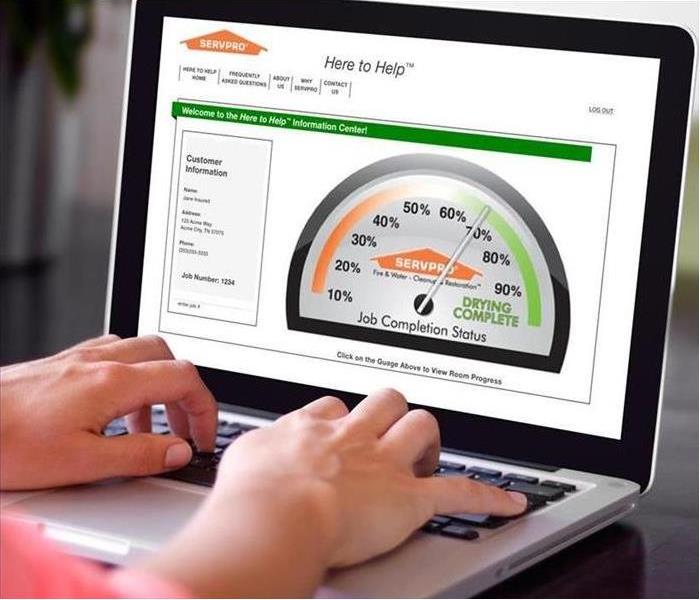 DRYBOOK
DRYBOOK
What is the Science of Drying? The Science of Drying or psychrometrics is a process that was created to establish guidelines, regulate techniques, and provide validation and documentation on the drying process. Our professional technicians are trained in the science of drying and follow strict industry standards to help lower the chances of any secondary damages.
Why is it important? When it comes to water damage, there’s nothing more important than making sure the job is done right the first time. Our team will:
- Inspect the building to detect every component that is wet to help prevent secondary damage from happening.
- Measure how much moisture is in the wet materials and monitor whether the materials are drying properly.
- Speed up Mother Nature by using professional grade drying equipment.
What does it mean to help Mother Nature? A wet building can dry naturally because the environment always seeks equilibrium. However, this only happens when in fact the air is actually drier. Unfortunately, secondary damage like mold may occur while the building is drying out. It's not only the equipment, but the technology SERVPRO Of Northwest Bergen uses as well to ensure your property is dry. SERVPRO Industries has developed DryBook, a proprietary tool that provides real-time documentation and updates on the drying process and help ensure industry drying requirements are met. Bottom line we make a water damage event "Like it never even happened."
Understanding Water Damage: Different Types of Water
7/21/2020 (Permalink)
When your home or business suffers a water damage event, understanding what type of water you are dealing with is critical to ensuring proper cleanup.
There are three types of water.
- Clean water is water from a broken pipe, or other water source; rainwater is also considered clean.
- The term gray water is used to classify slightly contaminated water. Clean water becomes gray water when left untreated allowing bacteria and other contaminants to begin growing, making the water hazardous.
- Black water is highly contaminated and filled with fungi, bacteria, chemicals and more. Black water is typically caused by sewage damage, flooding or any type of natural disaster. Black water should always be handled by trained professionals.
Consider taking the following precautions to help minimize damage or prevent further damage:
Damage from Clean Water:
DO:
- Shut off the water source if possible or contact a qualified professional to do so.
- Turn off the circuit breakers for wet areas of the building is access to the power distribution panel is safe from potential electric shock. Do not enter rooms with standing water, as electrical shock hazards may exist.
- Remove as much excess water as possible by mopping and blotting.
- Wipe excess water from wood furniture.
- Remove and prop up wet upholstery cushions to allow more even drying.
- Move moisture sensitive items like paintings, documents, and computers to a safe dry place.
DON"T:
- Do not leave books, newspapers, magazines, or other colored items on wet carpets or floors as they may cause staining.
- Do not use your house hold vacuum to remove water as there is potential for electric shock or causing damage to the vacuum cleaner.
- Do not turn on ceiling fixtures if the ceiling is wet; do not enter rooms where ceilings are sagging from retained water.
Damage from Contaminated Water:
DO:
- Avoid all contact with sewage and items contaminated by sewage. Wash your hands thoroughly if you come in contact with contaminated items.
- Discard any food and/or products for personal hygiene and cleanliness if exposed to the contaminated area.
DON'T:
- Do not walk through contaminated areas, as you could spread damage to unaffected areas.
- Do not turn HVAC system if there is a possibility of spreading contaminated air.
- Do not use household fans to dry the structure; air flow could spread contaminants.
When you have a water damage disaster, don't hesitate to call our professional team of Service Technicians. Dealing with the water quickly can often limit the amount of damage to your home and the cost of cleaning it up. Call SERVPRO of Northwest Bergen, we are your remediation and restoration experts in the Bergen County area.
The Science of Drying Water Damage
4/11/2019 (Permalink)
 Water Damage Cleanup
Water Damage Cleanup
Did You Know there is actually a science behind the process of drying?
At SERVPRO of Northwest Bergen County we have the Knowledge of psychrometrics which is essential to restoring a water damaged structure to its preloss condition. While your initial reaction may be to grab a few towels to mop up the mess and place a fan or two around the damaged area, SERVPRO of Northwest Bergen County is trained in the science of drying and follow strict industry-approved standards to help lower the chances of any secondary damages.
SERVPRO of Northwest Bergen County will:
- Inspect the building to detect every component that is wet, to help prevent secondary damage from happening.
- Measure how much moisture is in the wet materials and monitor whether the materials are drying properly.
- Speed up Mother Nature by using professional drying equipment.
SERVPRO technicians use the latest technology to help ensure your property is dried quickly and efficiently. DryBook™ is a proprietary tool that:
- Manages industry drying requirements.
- Provides real-time documentation on the drying process.
- Validates that services are executed to standards.
- Reports to all stakeholders involved.
- Allows real-time updates through DryBook™ Mobile Integration.
The bottom Line? SERVPRO of Northwest Bergen County has the training and equipment to help make water damage in your Bergen County home or business "Like it never even happened." To learn more about water damage and the process of cleaning your water disaster visit Water Damage Restoration Process
Clean Water vs. Contaminated Water
3/7/2019 (Permalink)
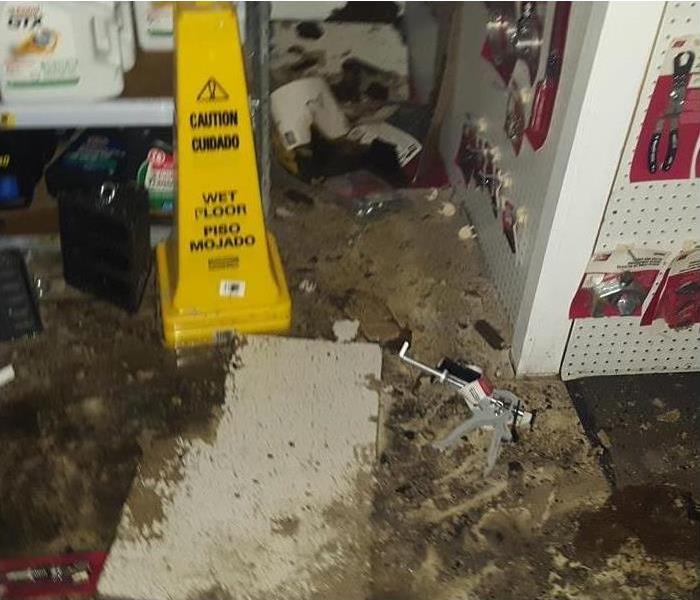 Contaminated water damage
Contaminated water damage
When your home or business in Rockland County suffers from a water damage disaster, understanding what type of water you are dealing with is critical to ensuring proper cleanup. There are three types of water. Clean water is water from a broken pipe, other water source, and rainwater. The term grey water is used to describe slightly contaminated water, which is usually clean water that has been left untreated allowing bacteria and other contaminants to begin growing, making the water hazardous. Black water is highly contaminated and filled with fungi, bacteria, chemicals and more. Black water typically caused by sewage damage, flooding or any type of natural disaster.
When you have water damage, don't leave your property to chance, and risk secondary damage. To learn more visit Water Damage Tips or call SERVPRO of Southern and Eastern Rockland County at 845-753-3730 to professionally cleanup any size water damage disaster.
 Water damage from a leak or broken appliances can lead to major damage if it is not taken care of quickly. Call SERVPRO of Northwest Bergen.
Water damage from a leak or broken appliances can lead to major damage if it is not taken care of quickly. Call SERVPRO of Northwest Bergen.




 24/7 Emergency Service
24/7 Emergency Service












